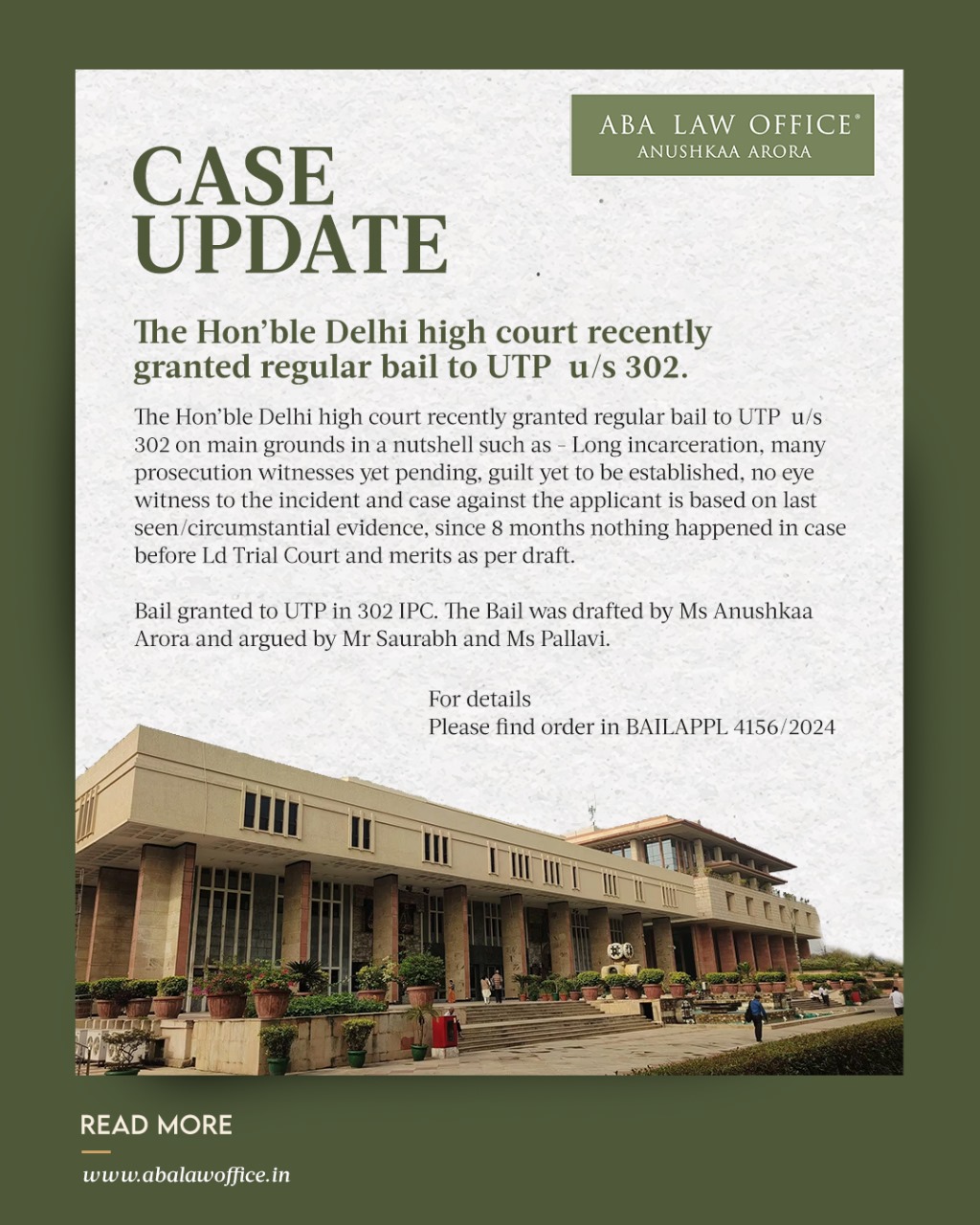2025-01-23
Delhi High Court Grants Regular Bail in 302 IPC Case: A Landmark Move on Grounds of Justice and Fairness

In a significant development, the Hon’ble Delhi High Court recently granted regular bail to an undertrial prisoner (UTP) accused under Section 302 of the Indian Penal Code in BAIL APPL 4156/2024. The judgment has been widely regarded as a testament to the court’s commitment to the principles of justice, due process, and the right to a speedy trial.
The Case in Brief
The applicant, accused of a heinous crime under Section 302 IPC, had been languishing in custody for an extended period. The case against the applicant was primarily based on circumstantial evidence and the theory of “last seen,” with no direct eyewitness to the incident. Despite the seriousness of the charge, the court took into account several compelling factors while delivering its verdict.
Key Grounds for Bail
The High Court’s decision was guided by a range of legal and factual considerations, which included:
1. Prolonged Incarceration: The applicant had already spent a substantial period in custody, raising concerns about unjustified deprivation of liberty without a trial.
2. Delay in Trial: The court noted that for over eight months, no substantive progress had been made before the Learned Trial Court. Several prosecution witnesses were yet to be examined, further delaying the trial.
3. Circumstantial Nature of Evidence: The prosecution’s case relied entirely on circumstantial evidence, and there was no direct eyewitness testimony implicating the applicant in the alleged crime.
4. Presumption of Innocence: Stressing that the guilt of the accused was yet to be established, the court upheld the principle that every individual is presumed innocent until proven guilty.
5. Right to a Speedy Trial: The delay in the case proceedings was found to be in contravention of the applicant’s fundamental right to a speedy trial.
6. Merits of the Case: Upon examining the bail application and supporting documents, the court was convinced that the evidence on record, at this stage, did not warrant further incarceration of the applicant.
7. Legal Representation: The meticulously drafted bail application by Ms. Anushkaa Arora highlighted the critical legal and factual issues that underscored the applicant’s right to bail. The case was effectively argued by a dynamic team comprising Mr. Saurabh and Ms. Pallavi, whose persuasive arguments emphasized the need for balancing the rights of the accused with the demands of justice.
8. The Court’s Observations: In its detailed order, the Hon’ble High Court observed: “In the present case, admittedly, the applicant is an under-trial prisoner and has undergone 4 years 8 months 28 days of incarceration. The guilt is yet to be established against the applicant. There is no eye witness to the incident and the case against the applicant is based on last seen/circumstantial evidence.
9. The applicant has clean antecedents and there are no other criminal cases pending against the applicant.
10. The applicant was granted interim bail from 10.07.2021 to 10.04.2022 and did not misuse the said liberty.
11. Lastly and importantly, only 14 out of 45 witnesses have been examined and there seems to be no likelihood that the trial will be concluded in the near future.
12. Reliance is also well placed on the judgment of this court in Ajay vs. State NCT of Delhi, 2024 SCC OnLine Del 3730. The relevant portion of the judgment reads as under:- “14. Apart from the merits of the case, it cannot be overlooked that the petitioner is in custody for approximately 03 years and 05 months and there is no possibility of the trial being concluded any time soon, inasmuch as out of 32 witnesses cited by the prosecution, about 20 witnesses have been examined till date. At this stage, there is also a presumption of innocence in favour of the petitioner and in the given circumstance the petitioner cannot be kept in custody to await the outcome of trial, the conclusion of which is likely to take long time.”
13. I am of the view that from 03.04.2024 till date, more than 8 months
14. have been elapsed and that in itself is a change of circumstances.
For the said reasons, I am inclined to allow the present bail application.”
Conclusion
This decision serves as a reminder of the judiciary’s role in safeguarding the fundamental rights of individuals, even in cases involving serious allegations. The order reaffirms the principle that justice delayed is justice denied and highlights the importance of fair trial guarantees in a democratic society.
The case, spearheaded by Ms. Anushkaa Arora and her legal team along with DHCLSC arguing counsels, is likely to set a precedent for similar cases, ensuring that undertrial prisoners are not subjected to undue hardships due to procedural delays.
Please see order
here

